 Introduction to a Postnational History of Contemporary Basque Literature (1978–2000)
Introduction to a Postnational History of Contemporary Basque Literature (1978–2000) Book contents
- Frontmatter
- Contents
- Preface and Notes on the Translation
- Acknowledgements
- I Postnational Theory and History
- II Writing the Nation: On Atxaga's Ethiopia and Obabakoak (1978-92)
- III After the Nation: Hybrid Postnational Literatures (1992-2000)
- 7 Before Babel: Globalization, Ethnic Hybridity, and Enjoyment
- 8 Terrorism as Memory: Historical Novels and Masochist Masculinity
- 9 Maternal Exile: Women Writers, Cultural Politics, and Individual Utopia
- 10 Melancholic Migrancy: Writing a Postnational Lesbian Self
- 11 Nationalist Crisis: Women's Literature and Neoliberalism
- Epilogue: Basque Literatures 2001-17
- Works Cited
- Index
8 - Terrorism as Memory: Historical Novels and Masochist Masculinity
from III - After the Nation: Hybrid Postnational Literatures (1992-2000)
Published online by Cambridge University Press: 06 September 2019
- Frontmatter
- Contents
- Preface and Notes on the Translation
- Acknowledgements
- I Postnational Theory and History
- II Writing the Nation: On Atxaga's Ethiopia and Obabakoak (1978-92)
- III After the Nation: Hybrid Postnational Literatures (1992-2000)
- 7 Before Babel: Globalization, Ethnic Hybridity, and Enjoyment
- 8 Terrorism as Memory: Historical Novels and Masochist Masculinity
- 9 Maternal Exile: Women Writers, Cultural Politics, and Individual Utopia
- 10 Melancholic Migrancy: Writing a Postnational Lesbian Self
- 11 Nationalist Crisis: Women's Literature and Neoliberalism
- Epilogue: Basque Literatures 2001-17
- Works Cited
- Index
Summary
To articulate the past historically does not mean to recognize it ‘the way it really was’ (Ranke). It means to seize hold of a memory as it flashes up at a moment of danger. Historical materialism wishes to retain that image of the past which unexpectedly appears to man singled out by history at a moment of danger. The danger affects both the content of the tradition and its receivers. The same threat hangs over both: that of becoming a tool of the ruling classes. In every era the attempt must be made anew to wrest tradition away from conformism that is about to overpower it […]. There is no document of civilization which is not at the same time a document of barbarism. Walter Benjamin,
Theses on the Philosophy of History (p. 255)Historical Discourses
Any analysis of Spanish culture that takes into account the proliferation of literary and nonliterary historical discourses must include Basque literature. This chapter argues that this multiplication of historical discourses must be connected to attempts to imagine anew the national foundations of the different communities that make up Spain. To illustrate this assertion, this chapter focuses on the historical fiction written in the 1990s by two prominent Basque writers, Bernardo Atxaga and Ramon Saizarbitoria. By studying the way in which the historical fiction of these two Basque writers articulates a specific national memory and subject position, some general conclusions can be drawn about the formation of historical discourses in post–Franco Spain.
In his Imagined Communities, Benedict Anderson discusses the importance of historical discourses in national processes of community imagining. When Anderson introduces his theory of the nation as an ‘imagined political community – and imagined as both inherently limited and sovereign’, he underlines the importance of the historical convergence of capitalism, language diversity, and print. However, when attempting to explain the ‘attachment’ or ‘political love’ nations elicit from their citizens (without which nations would fail as social constructs), Anderson returns to language's natural fatalism – in the sense that languages are not chosen by the people – and its connection to history: ‘If nationess has about it an aura of fatality, it is nonetheless a fatality embedded in history […]. Seen as both a historical fatality and as a community imagined through language, the nation presents itself as simultaneously open and closed.’
- Type
- Chapter
- Information
- Introduction to a Postnational History of Contemporary Basque Literature (1978–2000)Remnants of the Nation, pp. 197 - 226Publisher: Boydell & BrewerPrint publication year: 2019


